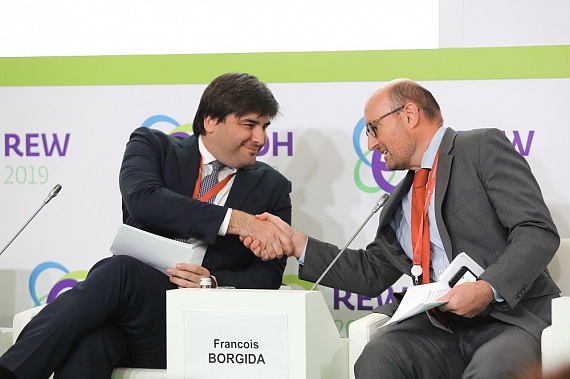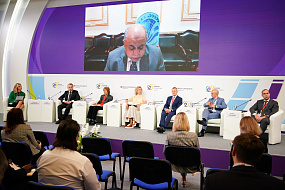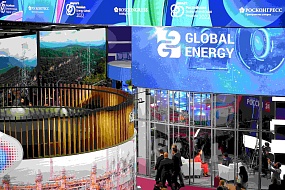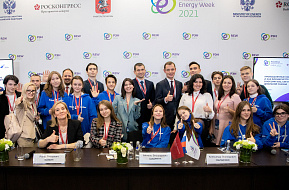Industry Leaders Discuss the Environmental Transformation of the Energy Market at REW 2019

On 3 October 2019 the session
‘EU–Russia Partnership: Opportunities for the Environmental Transformation of
the Energy Market’ was held at Russian Energy Week. The discussion was attended
by global leaders in the energy sector and industry experts, including Johan
Vanderplaets, Chairman, Association of European Businesses; President, Russia
and CIS, Schneider Electric, Carlo Palasciano Villamagna, General Director,
Enel Russia, David Campbell, President, BP Russia, Francois Borgida, Vice
President of Country Delegate Russia, Total SA, Alexander Liberov, President,
Siemens in Russia, and Maxim Shirokov, Chief Executive Officer, Unipro. Anton
Inyutsyn, Deputy Minister of Energy of the Russian Federation also took part in
the discussion. The meeting was moderated by Ernesto Ferlenghi, Chairman of the
Energy Committee, Association of European Businesses.
The speakers discussed the
current trends in the energy agenda, such as cooperation between countries and
business on the back of the environmental transformation of the global energy
sector. The speakers focused on the responsibility of global corporations for
the development of energy resources, the EU and Russia partnership in
environmental matters, and the balance between green energy and innovation.
“Russia today is one of the
leading global suppliers of energy resources. In our view there is tremendous
unrealized potential for cooperation and joint investment projects, and we will
continue to work to bring this potential to fruition. An important facet of such
partnerships is the joint implementation of cross-border environmental projects
and technologies,” said Anton Inyutsyn, Deputy Minister of Energy of the
Russian Federation.
One of the central aspects of
the discussion was devoted to how the innovations devised by European energy
companies will help the domestic energy sector transform in line with the new
environmental paradigm.
“A rapid way to increase the
efficiency of electricity production in Russia is to modernize power plants by
means of a gas-turbine topping at existing steam power units, which means a
transition from a steam power cycle to a combined cycle. Siemens, together with
its partners, has implemented such a solution at, for example, the Kirishskaya
TPP in Russia. In the long run, the share of renewable energy sources such as
wind, solar and water will increase. This, along with the electrification of
transport is creating new challenges for energy networks. They should have
sufficient power for the more rapid and flexible distribution of electricity,
and digital technologies should provide full control of this distribution, and
they should also be capable of realizing the potential of excess capacity,
through, for example, the use of electrical energy accumulation and storage
systems or energy conversion into highly energy-intensive chemicals such as
hydrogen,” said Alexander Liberov, President, Siemens in Russia.
The meeting participants noted
that the global energy system in the near future will be very different from
that of today due to the widespread introduction of renewable energy sources,
the increasing empowerment of customers to make informed energy consumption
choices, and the use of digital technologies in the industry.
The Russian Energy Week is organized by the Ministry of Energy of the
Russian Federation and the Roscongress Foundation with the support of Moscow
Government.





